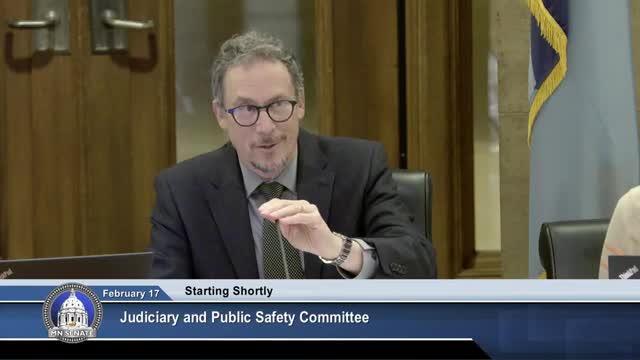Senate committee reviews bill to raise repeat fines for school bus stop-arm violations
Get AI-powered insights, summaries, and transcripts
Subscribe
Summary
The Senate Judiciary Committee heard testimony on Senate File 737, which would set escalating mandatory fines for repeat violations of Minnesota's school bus stop-arm law; testimony highlighted camera evidence, conviction rates and enforcement challenges. The committee laid the bill over for possible inclusion in a transportation omnibus package.
Senate File 737, a bill to establish escalating mandatory fines for repeat violations of Minnesota's school bus stop-arm law, was presented Monday to the Minnesota Senate Judiciary Committee and laid over for possible inclusion in a transportation omnibus package.
Senator Karin Nelson, presenting for chief author Senator Housley, told the committee the bill "is about mandatory fines for school bus arm violations" and would set a $500 minimum for a first conviction, $700 for a second within 10 years and $950 for a third or subsequent conviction within 10 years.
The bill’s sponsors and supporters said stronger, graduated fines paired with the stop-arm camera program could reduce repeat offenders and improve child safety. Eric Simonson, representing the Minnesota School Bus Operators Association, said the group "stands in full support of Senate File 737," and credited stop-arm cameras with reducing disputes and producing evidence for prosecutions.
Lieutenant Brian Rue of the Minnesota State Patrol told the committee that court records show 23 repeat convictions for stop-arm violations from Feb. 2015 through the 10-year window the committee discussed. He said law-enforcement records show roughly 1,000 to 1,200 stop-arm charges in a typical year and more than 1,800 in 2024, a rise the patrol attributed to wider camera use. He testified that the conviction rate is about 50–55 percent of charged cases, and that prosecutors frequently exercise discretion—cases may be pled down or dismissed depending on available evidence.
Senate Council provided statutory context and penalties. Mr. Backus, speaking for Senate Council, said Minnesota Statute 169.444 governs the stop-arm offense. He noted that a vehicle owner can be charged with a petty misdemeanor for a stop-arm violation (a payable offense carrying a $100 fine plus a $75 surcharge) but that if the driver is convicted the owner typically is not separately fined. Senate Council also clarified that gross misdemeanor-level offenses carry a maximum of 364 days in jail and a $3,000 fine and that the state’s existing statutes do not include a statutory repeat-offender minimum—an omission this bill seeks to correct.
Committee members pressed sponsors and witnesses on several enforcement and proportionality issues. Senator Limmer asked how often repeat offenders are recorded; Lieutenant Rue confirmed the 23 repeat convictions figure for the past decade but said his office could not always trace plea agreements where defendants accepted reduced charges. Senator Carlson raised concerns about identifying the actual driver from camera images and whether prosecutors have sufficient evidence to secure convictions. Senate Council and the State Patrol acknowledged those evidentiary challenges and said cameras increase the chance of identifying drivers but do not eliminate the need for corroborating evidence.
Senators also compared stop-arm penalties with other traffic offenses. Senate Council noted that the maximum fine for most misdemeanors is $1,000, which provided one benchmark members used when debating whether the bill’s escalated fines are proportionate.
The committee did not vote to advance or reject the bill; Chair (Senate Judiciary Committee) laid Senate File 737 over so the transportation committee can consider whether to include it in its omnibus package.
Votes at a glance: Senate File 737 — Presented by Senator Karin Nelson on behalf of Senator Housley; no committee vote on passage; outcome: laid over for possible inclusion in the transportation omnibus (laid over).
